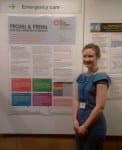 In April 2012 Professor Niro Siriwardena and Fiona Togher travelled to Paris with colleagues, Nadya Essam, Debbie Shaw (East Midlands Ambulance Service [EMAS]) and David Francis (East of England Ambulance Service) to attend the 17th International Forum on Quality and Safety in Healthcare.
In April 2012 Professor Niro Siriwardena and Fiona Togher travelled to Paris with colleagues, Nadya Essam, Debbie Shaw (East Midlands Ambulance Service [EMAS]) and David Francis (East of England Ambulance Service) to attend the 17th International Forum on Quality and Safety in Healthcare.
The team presented work undertaken as part of the Ambulance Service Cardiovascular Quality Initiative (ASCQI) a two year nationwide project involving all 12 ambulance trusts in England and the University of Lincoln funded by the Health Foundation.
From the 2,000 poster submissions that were originally received, around 900 were selected for display following a two stage peer review process. Fiona, Nadya and Debbie were all invited to present their work during the poster presentation session held. This provided a brilliant opportunity to talk to interested delegates from around the world about the quality improvement work and research that is being undertaken at the University and East Midlands Ambulance Service.

Fiona represented the IS-PROVE team, which also includes Professor Siriwardena and Dr Zowie Davy. Their poster entitled “The importance of qualitative methods for generating patient reported outcome measures and patient reported experience measures for pre-hospital and emergency care of stroke and heart attack” attracted attention from French, Swedish and American delegates that were keen to find out more. Nadya Presented on ergonomic redesign to improve care for heart attack and Debbie presented on ‘Joining the dots’ and the use of annotated control charts for quality improvement in ASCQI.

With a tough act to follow from last years’ excellent event in Amsterdam, Paris was just as enjoyable, thought provoking and inspiring. The key note speakers were again outstanding and captivated the audiences with their motivational reflections on working in health care and how to improve the quality of care provided to patients.
The opening keynote by Maureen Bisagnano from the Institute for Healthcare Improvement focused on goal oriented patient care, ‘what matters to patients’ and the redesign of services for patients. We heard about leadership from Dr David Williams, a Canadian professor of surgery who has been an astronaut and now leads a regional health organisation in Toronto.
Another highlight of the conference was the session entitled “Delivering better care to rural communities inAfrica” which focused on the application of quality improvement methods including Plan, Do, Study, Act cycles, to reducing asphyxia in newborn babies and mortality rates in children under the age of five. The success of the initiatives was amazing, more so because of the limited resources of equipment and manpower available.

One of the most inspiring speeches was given by Dr. Nancy Snyderman, who is not only a paediatrician and an ENT surgeon but also chief medical editor for NBC news in America – and an award winning journalist! Her speech focused on the importance of listening to patients and hearing what they are actually saying as opposed to what health care professionals presume they are saying. This central message resonated with what we are aiming to achieve through the patient experience studies that we are conducting in prehospital care in Lincoln and EMAS.
The take home message from this conference was that the application of quality improvement methodologies makes a real difference to the standard of care that is provided to patients; there were hundreds of examples of fantastic successes from around the world and in some instances the evidence translated to a significant contribution of quality improvement projects to saving lives.
Fiona Togher and Niro Siriwardena
